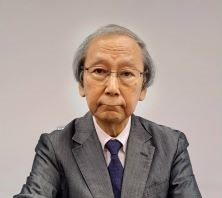The Global South in Asia and Japan can Play a Role in Establishing the 'Rule of Law'

By Masakazu Toyoda
Every morning we wake up expecting disastrous news from Ukraine and Gaza while, more recently, the number of disturbing news in the South China Sea and the Korean Peninsula is rising. Although the conflicting countries and regions may strongly believe in their "own" arguments or narratives, it is a fact that too many innocent people, as well as soldiers, have lost their lives as a result of these conflicts. As of September this year, two and a half years after the outbreak of the Ukrainian crisis, the death toll is estimated at over 30,000 Ukrainians and around 70,000 Russians. Meanwhile, the one-year-old Israel-Hamas conflict has so far claimed the lives of over 40,000 Palestinians and at least 1,500 Israelis.
The United Nations was specifically created to resolve these types of conflicts with equitable solutions. Unfortunately, it has been rendered useless, unable to function properly due to the invocation of specific vetoes by major states. On the economic trade front, the dispute settlement mechanism of the WTO is now dysfunctional, with no members appointed to the Appellate Body, the superior tribunal in a two-tier system.
Against this backdrop, there are growing concerns by countries of the Global South regarding the so-called post-war international order and the double standard applied by the developed countries. For example, as Russia's aggression against Ukraine is in clear violation of international laws, economic sanctions against Russia have been imposed. However, Israel's attacks on Gaza are not openly condemned by many developed countries and immediate ceasefires are not imposed. Some countries are even providing military support to Israel. What is this double standard all about?
The Global South is a concept that brings together various countries. It is comprised of countries from Africa, Latin America and the Middle East as well as emerging countries from Asia. It is a group of countries with middle power, and no one would consider China as part of the Global South. Each country has different interests, with different historical relationships with either the G7, other developed countries, or with China and Russia. As such, the countries of the Global South do not all necessarily behave or respond in the same way.
Therefore, we should first recognize that "diversity" is a feature of the Global South and, secondly, that some of those countries tend to be self-interest oriented. The same is true for some developed countries, as well as for China and Russia, as there is a growing and considerable leaning towards a home-country-first attitude.
One of the characteristics of the Global South countries is their emphasis on the application of the 'rule of law'. It would be fair to say that they view it as an important feature not only for themselves but for the world and as such, the Global South is not pleased with the current state of the international order. It is particularly disappointed at the composition of the United Nations Security Council and of the way the veto power works. As for the WTO, there is frustration that members of the Appellate Body are not appointed.
That is why the Global South harshly criticizes the double standard displayed by more than just a few developed countries and is determined to improve the system for the better. Then, why can't Japan and the Global South, which both respect the concept of the 'rule of law', cooperate to help rebuild the international order?
Japan is the third or fourth largest economy in the world in terms of GDP, while its military power ranks only seventh or eighth. Echoing the remorse of those that caused conflicts during World War II, Japan has forever renounced war in its Constitution. Even now, more than two generations later, Japan has no intention of possessing a military power beyond that of deterrence. In other words, Japan is literally choosing to be one of the middle powers while aspiring to an international peace based on justice and order. It is time for Japan to start working with the Global South in Asia to rebuild, and even improve the international order. Specifically, the world urgently needs not only a more democratic framework at the United Nations, but it also needs a dispute settlement mechanism of the WTO that is fully restored and functional again. Of course, those are by no means easy objectives and without an international order, it is undeniable that the maintenance of world peace and further economic development cannot be achieved. Be prepared, this would take a considerable amount of time and effort!
First, with the support of Australia, New Zealand, South Korea, Canada and other countries in the Indo-Pacific Region, the Global South in Asia and Japan should cooperate to expand the CPTPP (Comprehensive and Progressive Agreement for Trans-Pacific Partnership) and get more participating countries. Since the UK has joined, it should be possible to negotiate and conclude some kind of partnership agreement with the EU. In addition, until the WTO's dispute settlement mechanism is functional again, why not target the participation of more countries in the MPIA (Multi-party Interim Appeal Arbitration Arrangement)?
Second to the expansion of the CPTPP and MPIA should be the restoration of an operational United Nations by 2045, marking the centenary of its establishment.
The cooperation between the Global South in Asia and Japan will spread the 'rule of law' around the world. Let's walk the road of restoration step by step.
Masakazu Toyoda is chairman and CEO of the Japan Economic Foundation (JEF). He previously served as chairman and CEO of the Institute of Energy Economics, Japan, after having been vice minister for International Affairs at the Ministry of Economy, Trade and Industry.

